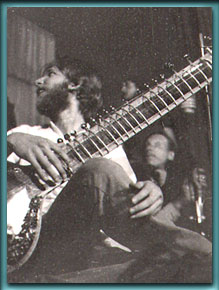
Rasa Deva

Benaras, India 1970
I had a dream that an Indian yogi would give me the spiritual name "Rasa Deva." The next day walking down the street I saw the yogi from my dream and I said to him, "I dreamt last night that you gave me the name Rasa Deva." He presented his palm with a flourish like a magician pulling a rabbit out of a hat and said, "Because that is your name."
Deva means Lord, and so I was promoted to "Lord of Rasa." In the spirit of taking a yogic name, my intention was to be able to turn my mind at any time, and focus on an uplifting idea. It's a kind of magic yoga trick. Whenever I think or hear the word "Rasa" I can immediately send my awareness up to a location just above my head and create with my imagination a little calm non-judgemental joyful version of myself. He sits up there compassionate, but detatched. From that lofty perspective the world always seems easier to swallow.
Rasa means many things in Sanskrit, and has meaning in a few other languages as well. In a common spiritual usage "Rasa" means Divine Nectar - the taste of enlightenment. It also means the simple verb "to taste" which I sometimes think of as having an appetite for life. In common speech it is used to mean essence, the sap or juice of plants, the juice of fruit, the best or finest or prime part of anything, marrow, liquor, drink, juice of the sugar-cane, syrup, draught, elixir, potion, melted butter, milk, soup, broth, the essential juice of the body, serum, the primary juice called chyle (formed from the food and changed by the bile into blood). It can mean Sarvad, the seminal fluid of Shiva, or simply any mineral or metallic salt, or a metal or mineral in a state of fusion. Rasa also means flavor of which there are six original kinds - sweet (madhura), sour (amla), salty (lavana), pungent (katuka), bitter (tikta), and astringent (kasaya). Rasa can also be any object of taste such as a condiment, sauce, spice, seasoning or it can mean a taste or inclination or fondness for love, affection, desire, charm, pleasure, or delight.
My favorite Sanskrit definition is simply "delight in existence."
![]()
The perspective from Indian Music philosophy. . .
from Ragopedia
Rasa means . . . the ultimate creation that a musician strives for, the ability to create through their art form a venue to touch the inner soul. To get to the root of your emotions, to blend completely through this auditory medium his emotions with the audience. This is when the performer and his audience fuse into one. The attainment of such purity is of primary importance in Indian music.
"All that you will learn about music, Indian or otherwise, strives for this final destination where musical notes transcend tonal boundaries and touch centers within the inner soul with a communicative power that can be described as pure enlightenment, or as some have put it, "fusion with god", hence the phrase, coined by the sage Yajnavalka, "true musicians don't have to go to heaven, they are already there!" If you have experienced something like this then you have experienced Rasa!
In the Sanskrit language, Rasa has many different meanings. But all these in a broader sense coalesce towards defining the multitude of human emotions. In one word, perhaps nectar would best describe it. Some define it as a state of climax of the subtle fanciful imagination, reflective emotions, and sentiments in a human mind. When aroused, they produce an extraordinary emotional change or alteration called Rasabhava.
Traditionally, there are nine different types of Rasa, although variations on these are also possible.
1. Shringar - This depicts the sentiment of love, sensuality, and erotic emotions.
2. Raudra - This covers the realm of anger, rage, and other violent wrathful emotions.
3. Hasya - Under this Rasa come the joyful, the comic, and happy emotions.
4. Vibhatsaya - Disgust and ludicrous emotions.
5. Veera - Bravery, heroism, and manliness are some of the attributes of this Rasa.
6. Karuna - Sadness, pathos, compassion, sympathy.
7. Bhayanak - This Rasa caters to the emotions of fear, anxiety, and uncertainty.
8. Adabhuta- Wonder and curiosity are two of the attributes of this Rasa.
9. Shanta - Contemplative, meditative and peaceful emotions form this Rasa.



